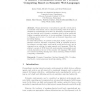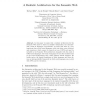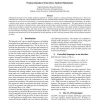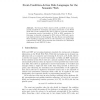1044 search results - page 25 / 209 » A Fuzzy Semantics for Semantic Web Languages |
NLDB
2004
Springer
14 years 29 days ago
2004
Springer
Human interaction occurs always in a specific context and in a particular environment, and a common knowledge base about them is essential for understanding each other. By immersi...
IJSWIS
2007
13 years 7 months ago
2007
We describe our research on automatically generating rich semantic annotations of text and making it available on the Semantic Web. In particular, we discuss the challenges involv...
RULEML
2005
Springer
14 years 1 months ago
2005
Springer
In this paper we argue that a realistic architecture for the Semantic Web must be based on multiple independent, but interoperable, stacks of languages. In particular, we argue tha...
LREC
2010
13 years 9 months ago
2010
Although the Semantic web is steadily gaining in popularity, it remains a mystery to a large percentage of Internet users. This can be ed to the complexity of the technologies tha...
EDBTW
2006
Springer
13 years 11 months ago
2006
Springer
Abstract. The Semantic Web is based on XML and RDF as its fundamental standards for exchanging and storing information on the World Wide Web. Event-condition-action (ECA) rules are...




